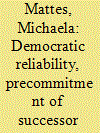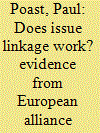| Srl | Item |
| 1 |
ID:
112135


|
|
|
|
|
| Publication |
2012.
|
| Summary/Abstract |
Given frequent leadership turnover and leaders' need to appeal to voters, democracies should face difficulties in maintaining their alliance commitments. Yet the empirical evidence predominantly shows that they do make reliable allies. Democratic governments can increase reliability by binding future administrations through the choice of alliance commitment. While defense pacts precommit future leaders to close military cooperation with an ally, consultation pacts leave more room for discretion. This research note examines when precommitment through a defense pact is likely to occur. A government should be more likely to conclude a defense pact if potential successors have different preferences regarding the alliance, if the government believes that it will lose power soon, and if the costs of precommitment are not too high. I test the theoretical expectations using the Alliance Treaty Obligations and Provisions (ATOP) data between 1945 and 2003. The findings support the argument and suggest an answer to the puzzle of why states sometimes conclude whole-hearted commitments and other times seemingly half-hearted ones.
|
|
|
|
|
|
|
|
|
|
|
|
|
|
|
|
| 2 |
ID:
112459


|
|
|
|
|
| Publication |
2012.
|
| Summary/Abstract |
Though scholars widely claim that issue linkage-the simultaneous negotiation of multiple issues for joint settlement-can help states conclude international agreements, there exist some notable skeptics. Resolving this debate requires empirical evidence. However, beyond a few case studies, there exists no direct and systematic evidence that issue linkages actually increase the probability of agreement. I address this lack of direct and systematic evidence by combing original data on failed alliance negotiations with data from the Alliance Treaty Obligations and Provisions (ATOP) database. Using matching techniques, I find that, for alliance negotiations between 1860 to 1945, offers of trade linkage did substantially increase the probability of agreement. Besides confirming issue linkage's ability to help clinch an agreement, this article's research design and evidence have far-reaching implications for the study of negotiations and alliances. The research design illustrates the value of considering the "dogs that didn't bark" as it identifies both successful and failed negotiations. The article's evidence explains the high rate of alliance compliance identified by previous scholars and highlights a need to rethink the alliance formation process.
|
|
|
|
|
|
|
|
|
|
|
|
|
|
|
|